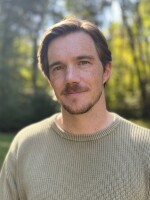John Coltrane is widely recognized as one of the most iconic and influential jazz musicians of all time. His work as a saxophonist and composer is known to the world, and it all started in North Carolina.
Coltrane was born in Hamlet, North Carolina in 1926. He grew up in High Point and started playing the saxophone as a teenager. Over the years, Coltrane’s musical prowess grew as he went on to compose and record albums such as “Giant Steps” and “A Love Supreme.” The new documentary “Chasing Trane” details Coltrane’s arch as a musician. Host Frank Stasio talks with John Scheinfeld, writer and director of “Chasing Trane,” about Coltrane’s upbringing in North Carolina and his influence on the world of jazz.
“Chasing Trane” airs Monday, Nov. 6 at 10 p.m. on UNC-TV.
View the trailer for "Chasing Trane" below:
https://www.youtube.com/watch?v=BRKd87h-0wg
Interview Highlights:
Scheinfeld on Coltrane’s myriad of influences during his younger years:
He was really a sponge and absorbed musical taste, technique, [and] repertoire from any number of sources throughout his life. Early stages he had his grandfather's church and radio, and in Philadelphia he came across a coterie of young musicians like him who were fascinated by jazz and tried their best to play it. So what you see is he becomes exposed to many different musicians and many different styles of playing. Some musicians emerge fully formed. Coltrane was not one of them. It was this sponge effect where he absorbs so much here and there, and it wasn’t until the mid-’50s where I feel he really was in place where his own unique voice could come out.
On how Miles Davis impacted John Coltrane:
When he joined Miles’ band, he was ready. He had paid his dues. He had played with all types of groups big and small. He’d even played honky-tonk bars, so he had incorporated a number of different disciplines and elements into his sound. But Miles was very disciplined, very talented, and arguably the Miles Davis Quintet became the finest jazz group in the world at that particular time. So to be part of that I think continued his musical education, and he learned a lot from Miles.
On Coltrane’s career after he quit using drugs:
It’s after getting clean that he gets back in touch with his spiritual side. He had fallen far from the tree of his grandfathers’. But then he starts exploring many different things. It’s not any one religion, and I think that also makes him very unique. He reads the Bible; he reads the Quran; he reads the Kabbalah, and he reads the theories of Albert Einstein. He’s an exceptionally curious person … He just absorbs thoughts and feelings and concepts from the world around him and somehow it all gets synthesized back through his horn. I think [what] you see after the 10 years he gets clean is a rapidly accelerating musical exploration where he starts off very traditional bebop. Then he starts to compose his own material. Then he starts to incorporate other sounds, whether it's African rhythms or Indian sounds and instrumentation, and eventually taking him to a very avant garde period in the last years of his life. But I think the undercurrent of all of this is a spiritual journey of seeking why we are here. What is our purpose. What are we meant to do, and how I can best express that through my music. I think that’s what makes him different from other musicians who might be in it for the women, the money or the fame. I don’t think he cared much about any of that. In fact you look at his musical output, and he is following his own muse, his own inspiration, rather than playing what was popular at the time.








